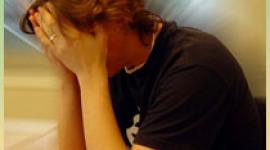Spontaneous Panic Attacks
 Q. I have what you have said are spontaneous panic attacks. They just happen any time any where and they can also wake me up at night. But my therapist tells me that 'spontaneous' panic attacks is just one particular theory amongst others. He believes this theory is wrong and thinks that I must have some sort of phobia that I am not recognizing. He also says my night attacks are a result of having a nightmare. I know what I experience, but now I am beginning to become confused and I am beginning to doubt my own experience. After all my therapist is an expert.
Q. I have what you have said are spontaneous panic attacks. They just happen any time any where and they can also wake me up at night. But my therapist tells me that 'spontaneous' panic attacks is just one particular theory amongst others. He believes this theory is wrong and thinks that I must have some sort of phobia that I am not recognizing. He also says my night attacks are a result of having a nightmare. I know what I experience, but now I am beginning to become confused and I am beginning to doubt my own experience. After all my therapist is an expert.
A. There was definitely some opposition to the three 'Panic Attack' categories in the Diagnostic and Statistical Manual Number Four (DSM 4)when it was released in 1994. This manual, is as it says, is the diagnostic manual for diagnosis of Mental Disorders which is used by the American Psychiatric Association. Some therapists did question the validity of these categories, primarily because it appeared to be at odds with their own particular schools of thought and the therapies they provide. Irrespective of the other varying theories about Panic Attacks, the DSM 4 is correct. My own experience of Panic Disorder and the thousands of people I have spoken with over the years show that this type of attack is very real and without doubt does happen. Not only is there the personal experience of so many of us who have this type of attack, the research and the subsequent release of the DSM 4 confirms the scientific validity of these attacks.
The sleep research also confirms that this type of attack is not a result of dreams or nightmares but occurs at the change of consciousness from dreaming sleep to deep sleep or from deep sleep back to dreaming sleep. Many people also report it occurs as they begin to enter the first stages sleep or as they begin to wake up.
Even though the attacks do occur for no apparent external reason, Cognitive Behavioral Therapy is the one therapy that has been proven Internationally to be the most successful long term therapy. I would suggest you discuss your concerns in detail with your therapist. If your therapist does not agree with your experience and is not prepared to work with you on that basis then you may wish to consider changing therapists. Your recovery must be your number one priority. Trying to fit your experience into a model that does not recognize the latest scientific research and diagnostic criteria is going to mean an unnecessary and costly uphill battle in your recovery.
The 1994 edition of the DSM 4 (Diagnostic & Statistical Manual, American Psychiatric Association) now shows that Panic Disorder is not a Phobic Response and people are not afraid of situations or places but are frightened of having a spontaneous panic attack. A conclusion we agree with without reservation.
next: Spontaneous / Uncued Panic Attacks
~ all articles on insights into anxiety
~ anxiety-panic library articles
~ all anxiety disorders articles
APA Reference
Gluck, S.
(2008, October 3). Spontaneous Panic Attacks, HealthyPlace. Retrieved
on 2026, January 12 from https://www.healthyplace.com/anxiety-panic/articles/spontaneous-panic-attacks


